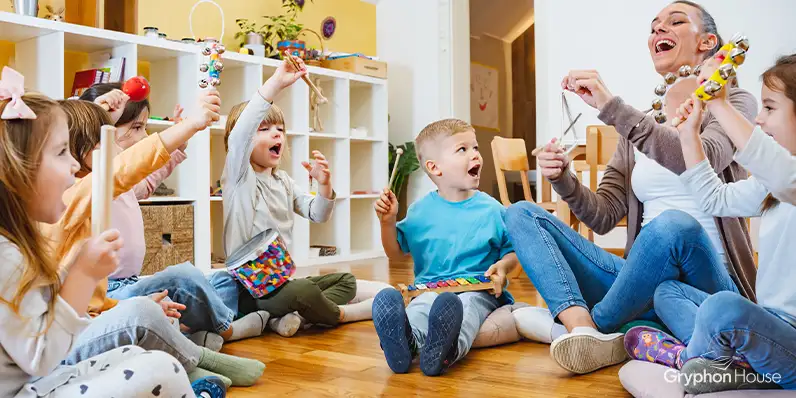4 Early Education Goals in the New Year
January 9th, 2014 | 3 min. read

Holiday breaks are a great time for spending time with family, but they're also a great time for teachers and parents to reset for the new year. With time to reassess, you can see what has and hasn't been working in your child's approach to learning. As you consider what direction you want your classroom or home to go in, we have compiled a few key areas with tips from The Insightful Teacher by Nancy Bruski that you may want to consider.
1. Make sure your learning spaces are effective.
Environment is essential in determining how much information children will retain when learning and how comfortable they will be while learning it. The right learning space can cause your child to really blossom. Here are some tips on how to create learning spaces that inspire:
- Make sure your space is well organized and well planned. This will allow children to see what activities are available and where they can find them. Areas can include art, literacy, science, sensory, block, math, dramatic play, music, quiet, community, and gross motor.
- Make sure areas make sense. If you have a block area, be sure it's in a space where there's not high traffic (by a door) so that kids don't have to worry about their creations being knocked over.
- Make sure your schedule is successful. Teachers must be attentive to the children's levels of focus. If you know they will get restless with reading time if it's more than 15 minutes, reflect that in your schedule.
- Make sure there is a designated area for kids to calm down. This area should always be visible to the teacher/parent, should include soft seating for them to feel comfortable, and should be separated from the others so they're not distracted. Reading material about feelings are always good to include in this space.
2. Focus on goal setting.
Setting goals is a huge part of beginning a new year. What questions have you been asking? Hopefully, one of the questions is what you want the children to learn and achieve during their preschool years.
- Make one of your biggest goals teaching children appropriate behavior. Help the children learn, gain self-esteem and confidence, and improve their behavior. Ensuring appropriate behavior is the framework to making sure children can properly learn.
- Make behavioral changes after increased observation. What are the children really saying? Many times, preschoolers' behavior reflects what they are feeling as they don't yet have words to describe what's going on. Taking note of the behavior as an explanation of what they're feeling is a good step toward finding solutions.
- Consider consequences for negative behavior. Children act out for different reasons; sometimes automatic consequences don't take into account the individualized nature of children. Be sure to assess why children are acting out and how to best develop an individualized intervention plan.
3. Build community inside and outside the classroom.
Since parents and teachers want the same thing--to foster their children's learning needs--it only makes sense that having a strong community is an essential part of a child's early education. Here are a few ways to make sure you're connecting with the parents and teachers around you:
- Start off on the right foot. Introductions are important. Upon enrollment, teachers should make sure rules, practices and expectations are clear. They should also take the time to get to know the families: cultural backgrounds, family traditions, home language, and educational expectations.
- Show parents that their involvement is valued! Keep the communication flowing, and invite family members to participate in programs by sharing stories, recipes, or traditions.
- Build trust. Get to know individual names and greet each family member in turn so that they know they are valued. Make sure you help with the transition of separation between the parent and child by putting certain practices into play such as morning goodbye routines, letting children write notes to their family, and providing books on attachment and separation.
- Keep an open line of communication. Some concerns are hard to share, but keeping that open line of communication with families is important. If you avoid discussing difficult topics, you will be met with resistance if you want to eventually discuss intervention decisions.
4. Foster social-emotional learning.
Though core subjects such as math, reading, science and art are irreplaceable in a child's education, teachers and parents must not underestimate the importance of social-emotional learning.
- Teach impulse control. Children must be able to contain their feelings long enough to think about using language, and they must be able to translate feeling into words rather than actions. Teachers must recognize a child's feelings, introduce new vocabulary to provide the child with a way to describe how he feels, and offer a positive response.
- Encourage children to cooperate with peers. Through interacting with peers, children learn how to communicate their needs and accept differences. If you notice conflict, sometimes an introduction of a new element can cause distraction and allow play to continue.
- Help children learn to negotiate conflicts. Offer phrases for children to use when something isn't working, such as, "I don't like that." It will let their play partner know they are not happy and alert the teacher to the situation as well. You can also suggest solutions to the problems, let the partners discuss the situation, and then return to acknowledge the solution they come up with.
We hope this post helps with moving forward with your children into the new year. If these tips helped resolve problems in your classroom or home, let us know! Delve even further into reflective strategies to shape children's early education by reading The Insightful Teacher by Nancy Bruski.
Author(s)Nancy Bruski
A graduate of Western Carolina University with a BA in English, Brianna served as a marketing and editorial Intern with Gryphn House in the Summer 2018.
Topics: